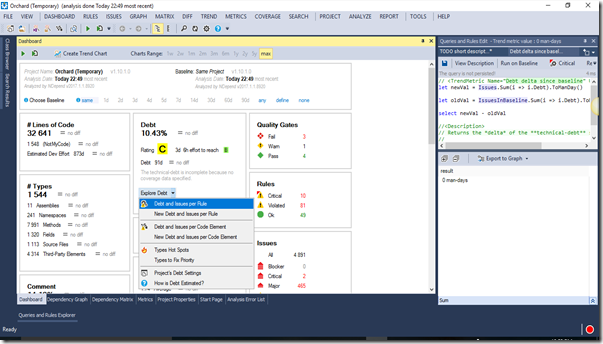Technical debt is a concept in programming that reflects the extra development work that arises when code that is easy to implement in the short run is used instead of applying the best overall solution at once after few release of the application.
It includes those internal things that you choose not to do now, but which will impede future development if left undone. especially in the context of refactoring.
In 1992, at the OOPSLA conference Ward Cunningham describes this concept as follows:
"Shipping first-time code is like going into debt. A little debt speeds development so long as it is paid back promptly with a rewrite. Objects make the cost of this transaction tolerable. The danger occurs when the debt is not repaid. Every minute spent on not-quite-right code counts as interest on that debt. Entire engineering organizations can be brought to a stand-still under the debt load of an unconsolidated implementation, object-oriented or otherwise."
Technical Dept increase with every release if residual issues left over from the last released are addressed. In Agile method, each sprint take care about the standard process to make a quality product but code refactoring and other stuff are not controlled at the right time then futures releases cost more in refactoring rather than doing at particular release using shortcuts. It is reduced by measuring Debt at every release to reduce to cost of the continuous development.
NDepend provide Continuous Code Quality using Smart Technical Debt Estimation. It enables you to estimate the cost to fix and the severity through customizable C# formulas for each issues persist at each sprint or release of the software.
In newer version NDepend v2017.1.0, NDepend estimates the technical-debt of a code base.
The technical-debt is estimated from C# LINQ formulas embedded inside each rule source code. This makes the the estimations both smart and easily customizable to your needs. In the below screen you will see the queries written for the predefined rules provided with the NDepend.
There are rules which can be added and modified as per the requirement. Debt estimation parameters are also customizable through NDepend Project Properties panel. See below images:
As per my opinion this feature is quite worth of use to improve the quality of the product for future cost reduction and it is quite easy to understand the serious Code Quality control in the development process through NDepend. It makes the managers to control the return on investment made on quality.
Hope NDepend benefits others to reduce the Technical Debts for their products..



